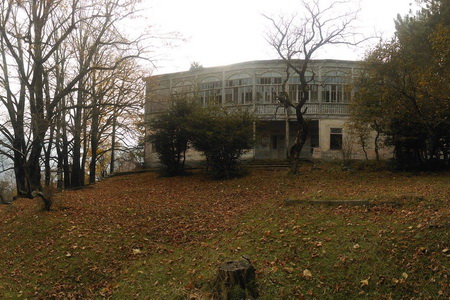State project to restore museum for independence movement leader Dimitri Kipiani

The museum for Georgia’s leading 19th century public and cultural figure Dimitri Kipiani will be restored under a project involving professionals from state cultural agencies in village of Kvishkheti.
The restoration effort is already underway at the 1860-built estate in the village of Khashuri Municipality, two hours drive west of capital Tbilisi.
Announced by the National Agency for Cultural Heritage Preservation of Georgia, the work will save the historical venue and its exhibits on life and work of Kipiani (1814-1887).

A digital rendering of the renovation project for the museum. Photo: Georgia’s Cultural Heritage Agency press office.
The museum was opened in the estate, initially built as a country house for Kipiani, in 1990 and houses documentary material, publications, manuscripts, letters, photographs and other exhibits.
Also involving the Ministry of Culture and Monument Protection of Georgia, the restoration started this month with financial support from the municipality.
The cultural heritage agency said "various type of damage” on the building has caused negative effect on its stability, with extensive restoration effort needed to bring it up to museum standards.
The building’s architecture was changed heavily following its handing over to the Georgian Writers’ Union during the Soviet times.
However, the venue still features glimpses of its original plans as well as artistic elements including decorations of its balconies, fireplaces and wall cupboards.
Its courtyard also includes a unique octagonal pool built based on a request by Kipiani.

The venue has suffered damage via neglect and its stability has deteriorated. Photo: Georgia’s Cultural Heritage Agency press office.
The estate is a major venue paying homage to cultural and political career of Kipiani — publicist, translator and a leader of Georgia’s 19th century movement for independence from the Imperial Russia.
Born in central Georgian village of Mereti in 1814, Kipiani was involved in the 1832 plot of the Georgian nobility for overthrowing the Imperial Russian rule over the country and restoring its independence.
Forcefully resettled into north-western Russia’s city of Vologda as a punishment for his participation in the plot, Kipiani returned to his homeland in 1837.
Emerging as a leader of Georgia’s liberal nobility, he served as Vice President of the Agricultural Society of the Caucasus and a co-founder of the Tbilisi Bank of Nobility and the Society for the Spreading of Literacy among Georgians.
Kipiani also worked as Mayor of Tbilisi from 1876-1879.

The museum houses exhibits and materials illustrating Kipiani’s work. Photo: Georgia’s Cultural Heritage Agency press office.
A proponent of transforming the social relations in Georgia into the European model, he also contributed to the preparations for the dissolution of the feudal system in his country.
Among his major efforts was preservation of the national language in Georgia as a platform for civil and political development.
In the literary field, Kipiani's work included translation of major foreign-language works by authors including William Shakespeare and French playwrights Moliere and Pierre Beaumarchais.
The celebrated public figure used the Kvishkheti estate until 1886, when he became subject of a second forceful resettlement for his activities.
The Imperial Russian authorities resettled Kipiani to Stravropol in south-west Russia for his criticism of Exarch Pavel, an Orthodox religious governor appointed for Georgia from Russia.
Kipiani was assassinated in Stavropol a year later, under uncertain circumstances.
His body was reburied to the Mtatsminda Pantheon of Writers and Public Figures in Tbilisi the same year, with a large gathering during his burial turning into a public demonstration against the local government.
Kipiani was posthumously canonised by the Patriarchate of Georgia in 2007.
 Tweet
Tweet  Share
Share